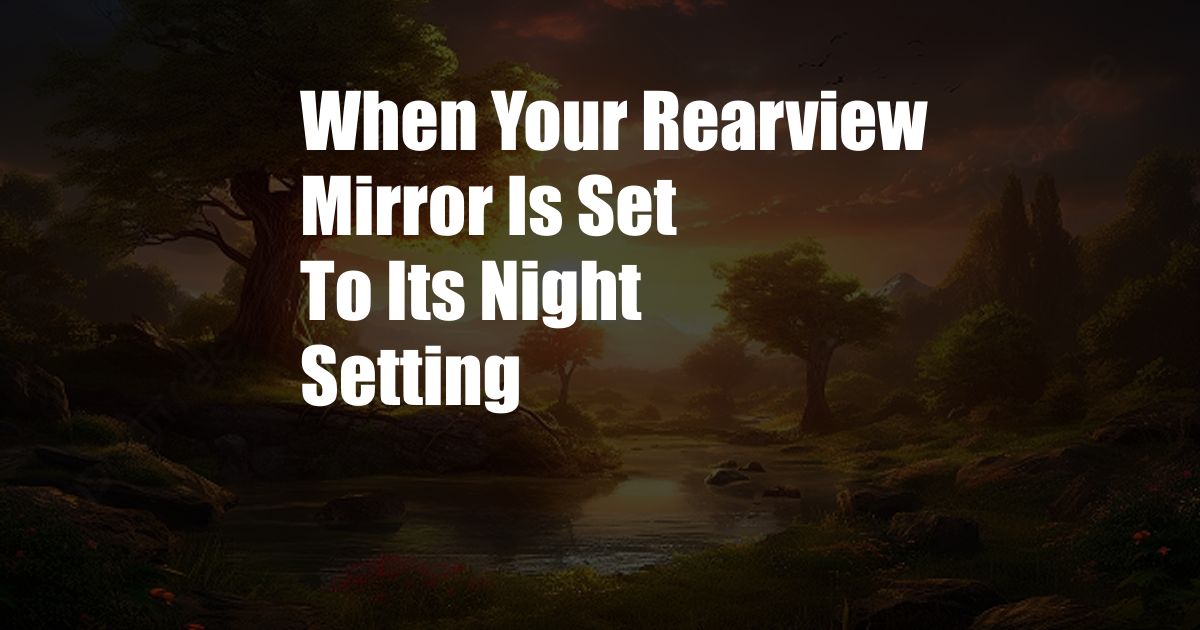
Rearview Mirror Night Setting: When to Use It and Why
As I drove home one foggy night, my rearview mirror was casting an annoying glare into my eyes. I couldn’t see clearly, and I was starting to get a headache. Suddenly, I remembered the night setting on my mirror. I flicked the switch, and the glare instantly disappeared. I could finally see again!
The night setting on your rearview mirror is a lifesaver when driving at night. It helps to reduce glare from headlights behind you, making it easier to see and stay safe. In this article, we’ll take a closer look at the night setting, including when to use it, how it works, and some tips for getting the most out of it.
What Is the Night Setting?
The night setting on your rearview mirror is a feature that helps to reduce glare from headlights behind you. It does this by dimming the mirror’s reflective surface, making it less likely to bounce light back into your eyes.
Most rearview mirrors have a small lever or switch that you can use to activate the night setting. When the night setting is on, you’ll see a small indicator light on the mirror.
When Should I Use the Night Setting?
You should use the night setting on your rearview mirror whenever you’re driving at night. This is especially important in areas with a lot of traffic, as the headlights from other cars can be very bright and distracting.
You may also want to use the night setting when driving in foggy or rainy conditions. The glare from headlights can be even worse in these conditions, so the night setting can help you to see more clearly.
How Does the Night Setting Work?
The night setting on your rearview mirror works by dimming the mirror’s reflective surface. This is done using a combination of materials and coatings. Some mirrors use a special type of glass that is less reflective than normal glass. Others use a coating that helps to absorb light.
When the night setting is on, the mirror’s reflective surface is dimmed, which reduces the amount of light that is bounced back into your eyes. This makes it easier to see and stay safe while driving at night.
Tips for Getting the Most Out of the Night Setting
Here are a few tips for getting the most out of the night setting on your rearview mirror:
- Make sure the night setting is clean. A dirty mirror can reduce the effectiveness of the night setting.
- Adjust the angle of the mirror so that it is aimed at your eyes. This will help to reduce glare from headlights behind you.
- If you’re still having trouble with glare, you may want to try using a sunshade. A sunshade can help to block out additional light from the sun and headlights.
FAQ
Q: Why is my rearview mirror not dimming?
A: There are a few reasons why your rearview mirror may not be dimming. First, make sure that the night setting is turned on. If it is on, then the mirror may be dirty or damaged. Try cleaning the mirror with a glass cleaner. If that doesn’t work, then you may need to replace the mirror.
Q: How can I adjust the night setting on my rearview mirror?
A: Most rearview mirrors have a small lever or switch that you can use to adjust the night setting. The lever or switch will usually be located on the back of the mirror or on the side. Move the lever or switch to the desired setting.
Q: Is the night setting on my rearview mirror safe?
A: Yes, the night setting on your rearview mirror is safe. It helps to reduce glare from headlights behind you, making it easier to see and stay safe while driving at night.
Conclusion
The night setting on your rearview mirror is a valuable safety feature that can help you to see more clearly and stay safe while driving at night. By following the tips in this article, you can get the most out of the night setting and make your driving experience more enjoyable.
Are you interested in learning more about car safety features?